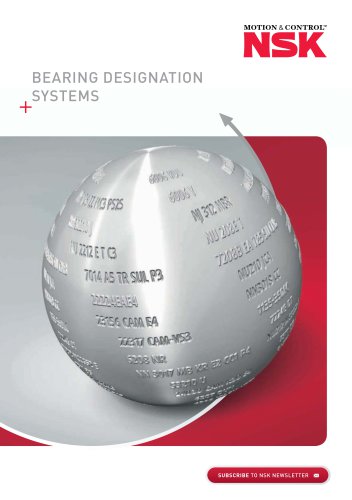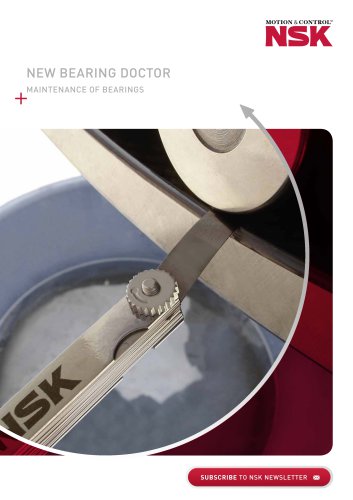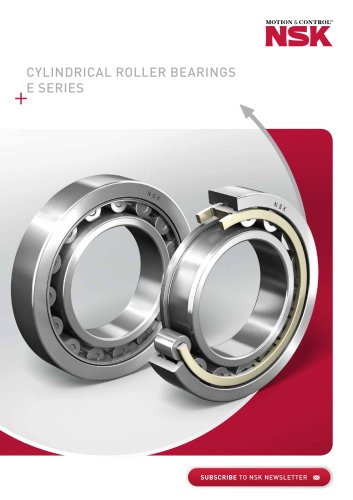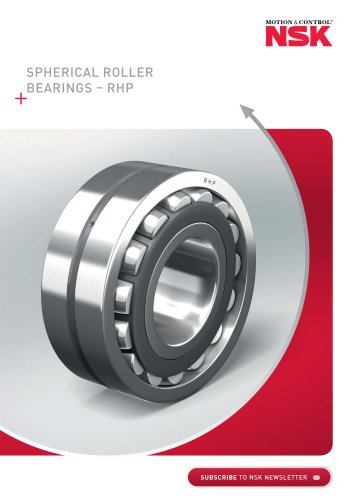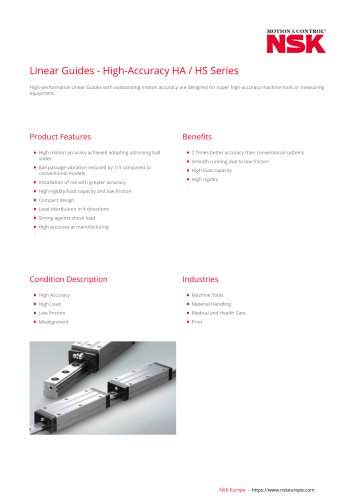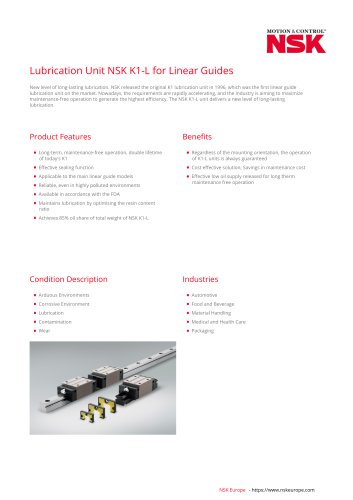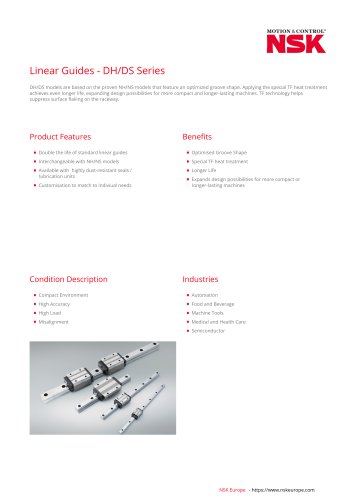
Catalog excerpts

BEARING DESIGNATION SYSTEMS
Open the catalog to page 1
As one of the world’s leading manufacturers of rolling bearings, linear technology components and steering systems, we can be found on almost every continent – with production facilities, sales offices and technology centres – because our customers appreciate short decision-making channels, prompt deliveries and local service.
Open the catalog to page 2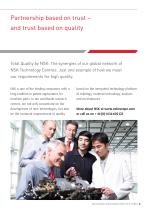
Partnership based on trust – and trust based on quality Total Quality by NSK: The synergies of our global network of NSK Technology Centres. Just one example of how we meet our requirements for high quality. NSK is one of the leading companies with a long tradition in patent applications for machine parts. In our worldwide research centres, we not only concentrate on the development of new technologies, but also on the continual improvement of quality based on the integrated technology platform of tribology, material technology, analysis and mechatronics. More about NSK at www.nskeurope.com...
Open the catalog to page 3
BEARING DESIGNATION SYSTEMS 5
Open the catalog to page 5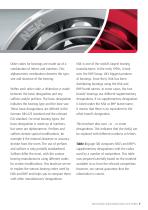
Order codes for bearings are made up of a combination of letters and numbers. This alphanumeric combination denotes the type, size and structure of the bearing. Within each order code, a distinction is made between the basic designation and any suffixes and/or prefixes. The basic designation indicates the bearing type and the bore size. These basic designations are defined in the German DIN 623 standard and the relevant ISO standard. For most bearing types, the basic designation is made up of numbers, but some are alphanumeric. Prefixes and suffixes denote special modifications, for example...
Open the catalog to page 7
How the order codes for bearings are made up The diagram below shows how the order codes are made up. There should be spaces separating the individual sections of an order code from one another. Basic designation Prefix Code for the bearing series Code for the bearing bore Suffix
Open the catalog to page 8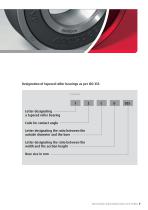
Designation of tapered roller bearings as per ISO 355 Example Letter designating a tapered roller bearing Code for contact angle Letter designating the ratio between the outside diameter and the bore Letter designating the ratio between the width and the section height Bore size in mm BEARING DESIGNATION SYSTEMS 9
Open the catalog to page 9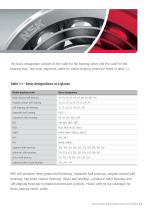
The basic designation consists of the code for the bearing series and the code for the bearing bore. The most important codes for metric bearing series are listed in table 1.1. Table 1.1 – Basic designations at a glance Metric bearing series Basic designation Deep-groove ball bearing Angular-contact ball bearing Self-aligning ball bearing Separable ball bearing Cylindrical roller bearing Tapered roller bearing Spherical roller bearing Thrust ball bearing Spherical roller thrust bearing RHP still produces deep-groove ball bearings, separable ball bearings, angular-contact ball bearings,...
Open the catalog to page 11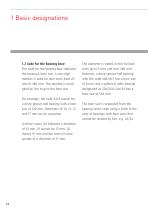
1.2 Code for the bearing bore The code for the bearing bore indicates the bearing’s bore size. A two-digit number is used for bore sizes from 20 mm to 480 mm. This number is multiplied by five to give the bore size. For example, the code 6224 stands for a deep-groove ball bearing with a bore size of 120 mm. Diameters of 10, 12, 15 and 17 mm are an exception. In these cases, 00 indicates a diameter of 10 mm, 01 stands for 12 mm, 02 means 15 mm and the code 03 corresponds to a diameter of 17 mm. The diameter is stated in mm for bore sizes up to 9 mm and over 480 mm. However, a deep-groove...
Open the catalog to page 12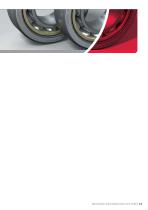
BEARING DESIGNATION SYSTEMS 13
Open the catalog to page 13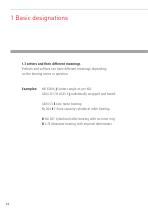
1.3 Letters and their different meanings Prefixes and suffixes can have different meanings depending on the bearing series in question. HR 33206 J Contact angle as per ISO 6204 ZZ C3E AS2S 5 J Individually wrapped and boxed 6304 C3 E Low noise bearing NJ 204 E T Extra capacity cylindrical roller bearing R NU 207 Cylindrical roller bearing with no inner ring R 4 ZZ Miniature bearing with imperial dimensions
Open the catalog to page 14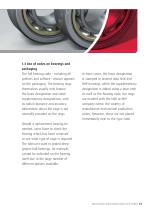
1.4 Use of codes on bearings and packaging The full bearing code – including all prefixes and suffixes – always appears on the packaging. The bearing rings themselves usually only feature the basic designation and some supplementary designations, such as radial clearance and accuracy. Information about the cage is not normally provided on the rings. In most cases, the basic designation is stamped or lasered onto NSK and RHP bearings, while the supplementary designation is added using a laser etch. As well as the bearing code, the rings are marked with the NSK or RHP company name, the...
Open the catalog to page 15
Prefixes are used comparatively rarely. They serve almost exclusively to indicate individual components of complete bearings or to designate miniature bearings. The codes are listed in table 2. Table 2 – Prefixes at a glance NSK Definition Bearing with special dimensions, example: B 15 Housing insert with no eccentric ring, example: B1030-30DEC Bearing with flanged outer ring, example: F 684 ZZ MC3 NS7L For tapered roller bearings and deep-groove ball bearings: higher load rating, example: HR 32210 J J Lubrication hole on the same side as the mounting screws or eccentric collar lock,...
Open the catalog to page 17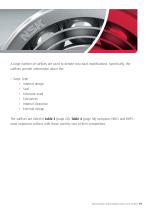
A large number of suffixes are used to denote structural modifications. Specifically, the suffixes provide information about the: › Gage › › › › › › Type Internal design Seal Lubricant used Tolerances Internal clearance External design The suffixes are listed in table 3 (page 20). Table 4 (page 38) compares NSK’s and RHP’s most important suffixes with those used by two of their competitors. BEARING DESIGNA
Open the catalog to page 19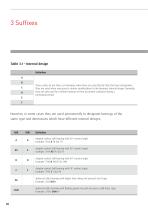
Table 3.1 – Internal design Definition A B These codes do not have set meanings when they are used directly after the basic designation. They are used when necessary to denote modifications to the bearing’s internal design. Normally, they are only used for a limited amount of time to prevent confusion during a transitional period. However, in some cases they are used permanently to designate bearings of the same type and dimensions which have different internal designs. Angular-contact ball bearing with 30° contact angle Example: 7014 A TR SUL P3 Angular-contact ball bearing with 25°...
Open the catalog to page 20All NSK Europe Ltd. catalogs and technical brochures
-
TECHNICAL REPORT
302 Pages
-
NEW BEARING DOCTOR
44 Pages
-
ROLLING BEARINGS
704 Pages
-
LARGE SIZE ROLLING BEARINGS
564 Pages
-
HA / HS Series
1 Pages
-
NH and NS Series
1 Pages
-
K1
1 Pages
-
K1-L
1 Pages
-
DH/DS Series
1 Pages

